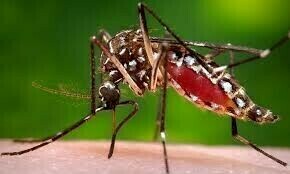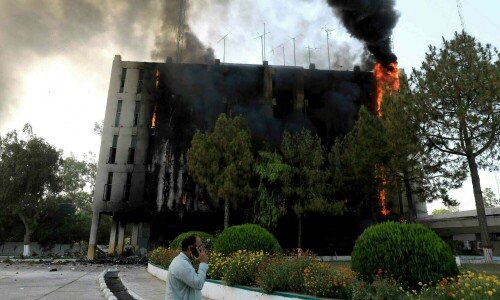• Over 17,000 malaria cases emerge in Sindh within two weeks
• Experts describe the number of reported cases as the tip of the iceberg
• Doctors discourage frequent use of painkillers due to their effects on kidneys
KARACHI: There is no let-up in cases of mosquito-borne diseases across the province with at least 17,000 cases of malaria reported in several cities within two weeks in various districts, it has emerged.
According to the data released by the Vector Borne Disease Directorate General Health Services, a total of 267,389 cases of mosquito-borne illnesses had been reported in the province from January till the first week of November, with malaria reporting the highest number of infections (265,021) followed by dengue (2,179 cases and one death) and chikungunya (189 cases).
The division-wise breakdown for malaria showed that Hyderabad was the hardest-hit region with 126,584 cases, followed by Larkana with 59,752, Mirpurkhas with 35,248, Shaheed Benazirabad with 22,647, Sukkur with 18,718, and Karachi with 2,072.
A total of 6,015,702 patients were screened for malaria in the province.
During the same period (January-Nov 9), a total of 2,179 cases of dengue were reported in the province, with one death in Karachi.
“These stats represent only the tip of the iceberg. The actual number of cases must be higher than what is being officially shared, given the big gaps in our surveillance system and our limited capacity for diagnosis,” said Dr Abdul Ghafoor Shoro of the Pakistan Medical Association, attributing the spike in vector-borne diseases to the absence of fumigation drives.
He regretted that preventive healthcare had never been a priority for the officials.
“The government’s focus is only on a few tertiary care hospitals on which it’s willing to spend billions of rupees without accountability. On the other hand, people are deprived of clean drinking water and there are periodic spikes in vaccine-preventable and vector-borne diseases because there is no attention or budget for preventive and primary healthcare.”
Lack of surveillance
Sources said currently 80 per cent of the patients reporting to general physicians were mainly presenting with complaints of high fever and acute joint pains.
“The patients are told that they got chikungunya, though the doctors don’t have any scientific evidence to back their claim. Having said that, doctors generally rule out the possibility for dengue and malaria before prescribing a treatment plan to these (suspected chikungunya) patients,” said a senior general physician.
“Even if the disease is confirmed (through a lab test) to be chikungunya, it doesn’t affect any change in the treatment plan. The aim primarily is to alleviate the symptoms’ severity as the recovery process in a viral disease usually begins within three to four days on its own,” he explained.
Tests for chikungunya, he pointed out, were not only costly but there was also an issue of their reliability.
According to sources, several laboratories have started offering tests for chikungunya in recent months since its cases have seen a continued rise in the city. Earlier, the test was available at only one private hospital.
“The hospital recently ran out for its diagnostic kits. It’s now offering a package comprising tests for dengue, malaria and chikungunya for Rs7,600,” shared another doctor, adding that cases of mosquito-borne illnesses had been on the rise in Karachi since Eidul Azha.
“In cases of chikungunya, fever subsides but joint pains persist for months for which doctors prescribe supplements and suggest daily exercise. We discourage frequent use of painkillers as this can affect kidneys,” a doctor said, while emphasising the need for local studies to assess viral mutations that could help develop affective treatment plans.
Published in Dawn, November 11th, 2024















































